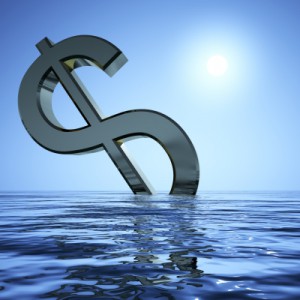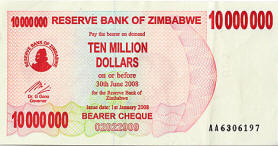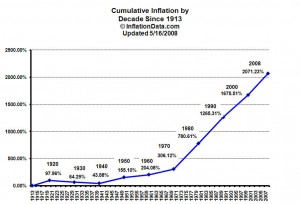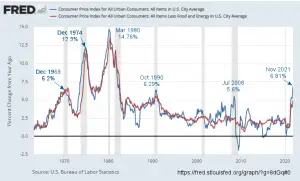Define Deflation: In common usage deflation is generally considered to be "falling prices". But there is much more to it than that. Often people confuse deflation with disinflation or with Depression (as in "the Great Depression"). These three terms are related but not synonymous. According to Investorwords.com the definition of Deflation is "a decline in general price levels, often caused by a reduction in the supply of money or credit. Deflation can also be brought about by direct contractions in spending, either in the form of a reduction in government spending, personal spending or investment spending. Deflation has often had the side effect of increasing unemployment in an economy, … [Read more...]
Zimbabwean Hyperinflation Officially Estimated At 2.2 Million Percent
This is a textbook case of how to create hyperinflation by thinking you can print all the money you want. It is interesting to note that Mugabe blames Britain for trying to undermine his regime when in fact while under British control, Zimbabwe was Africa's second richest country (behind South Africa). But under Mugabe's reign Zimbabwe has become a basket case due primarily to misguided economic policy. Several years ago Mugabe nationalized the large farms and took control from productive farmers and gave control to his cronies (who knew nothing about farming) and then he wondered why farm production fell. Duh? Now inflation is increasing so fast his central statistical office can't keep … [Read more...]
Euro Area Inflation Estimated at 4.0%
At 4% Euro Area inflation is very similar to the U.S. Inflation rate. On June 30, 2008 the Eurozone released what they call a "Flash" estimate of their inflation rate for the month of June. It is provisional and could be modified before the final release. But they claim it is 95% accurate. Calculating Inflation in the EuroZone is more complex than for a single country. Their individual country inflation calculations are called HICPs (Harmonised Indices of Consumer Prices). Current Euro Area Inflation Chart (1 Yr) %CODE3% Chart courtesy of www.rivaluta.it While the combined inflation rate is called "The Monetary Union Index of Consumer Prices" (MUICP) which … [Read more...]
Cumulative Inflation by Decade
How Much Inflation have we had since 1913? Just like compound interest compound inflation grows faster and faster. The average annual inflation since 1913 is "only" 3.42%. But as you can see from the chart to the right compounding something for almost 100 years at 3.42% will result in over 2000% inflation. A 2071% increase is a hard concept to grasp so to put it another way, something that cost $1.00 in 1913 would cost $21.71 today ($1 + $20.71 inflation). Or conversely a dollar today is only worth 4.8¢ in 1913 dollars. In other words the government over the years has stolen 95.2¢ out of every dollar. … [Read more...]
How can we have Inflation and Deflation at the same time?
In common usage, deflation is generally considered to be "falling prices" while Inflation is "rising prices". Actually this is "price inflation" as opposed to "monetary inflation". For more information see What is Deflation? and What is Inflation? and Inflation Cause and Effects. So if inflation is rising prices and deflation is falling prices, how can prices rise and fall at the same time? Somehow that seems counter intuitive. Obviously, when the Bureau of Labor Statistics comes up with the Consumer Price Index it is either higher or lower than the month before so we have inflation or deflation. But that is the number for the whole economy, it includes over 10,000 items and … [Read more...]
Inflation and Financial Services
I recently received the following question from Zimbabwe. Question: What is the Impact of Inflation on Financial Services Performance? B. Sibanda Zimbabwe Dear Mr. Sibanda , The most obvious effect of inflation on financial services is that an investment has to perform that much better just to remain even. For instance, under normal circumstances 10% is considered a good rate of return. However, if inflation is 100% and you only earn 10% you have not made any money you have actually lost 45% of your purchasing power. The calculations are as follows: … [Read more...]
Money Supply and the Inflation Rate
Dear Editor, I found your web site as I was doing some in depth research on inflation. In looking at the CPI published by the Federal Reserve Bank of Minneapolis you'll notice three columns. The column on the right shows the "Annual Percent Change (Rate of Inflation)" which appears to be the one you publish on your web site. However, if you do the math and take the years 2006 & 2007 as an example, you'll see that in 2006 the CPI (center column) was 201.6. If you then add 2.9% (right column) you get 207.3 (center column) for 2007. The column on the right merely reflects the percentage of change over the previous year and is not the true inflation we're having. According to the … [Read more...]
What is Core Inflation and Why Doesn’t It Include Food and Energy?
Updated 12/11/2021 I frequently receive this question in one form or another: Why doesn't the government consider food and energy and just tracks core inflation? The core inflation rate is frequently quoted in the popular press, and this gives the general public the impression that the "government" doesn't care about (or track) the rise in the prices of food and energy. Actually, this isn't true. The core inflation rate is simply a component of the overall inflation rate. Economists use it because seasonal factors often skew the inflation rate. For instance, a drought might cause fruit crops to fail, causing fruit prices to rise. But this rise actually has nothing to do with … [Read more...]
Oil and Price Inflation
I recently received the following question from a student in Malaysia. I thought it was a good question so I am including it here. Dear Sir, Greetings, I am a student of International Islamic School Malaysia, Kuala Lumpur. I hope you are well. I am in grade 10 and I take business studies as one of my subjects. Recently I had a class on inflation in my school. The teacher said when fuel prices alone rises we cannot term that as inflation. I disagree with that because I think that rising fuel price is the only exception where we can say that it is inflation. When fuel prices increase the price of all other commodities increase ... please tell me if it is right or wrong to say that … [Read more...]
How does the “Falling Dollar” and the exchange rate affect Inflation?
With all the recent talk about the "falling dollar" will that affect the inflation rate? Let's start with the basics. 1) Price inflation is primarily caused by monetary inflation. In other words as the money supply increases things cost more. See What is Inflation? for a full explanation. 2) The government controls the money supply to a certain extent through tightening or loosening credit. 3) The economy is extremely complex and many other factors come into play. Such as international exchange and the supply and demand for goods and services. At first blush it might appear that the falling dollar would cause deflation because the dollar is going down. But if the dollar is … [Read more...]





